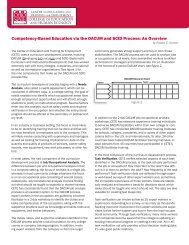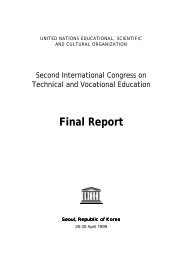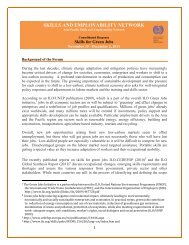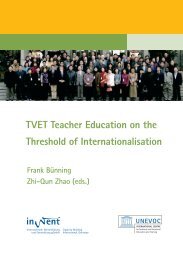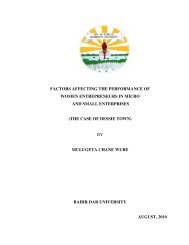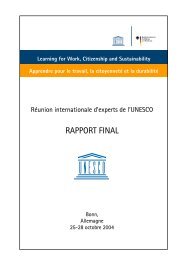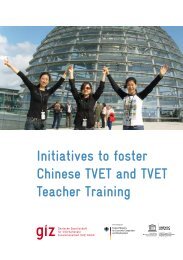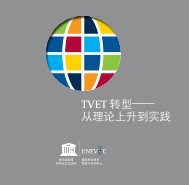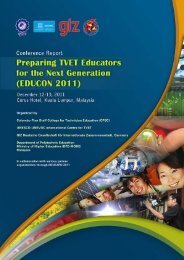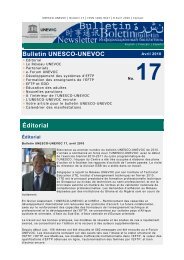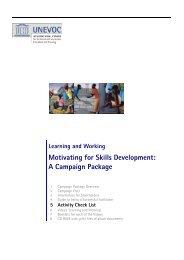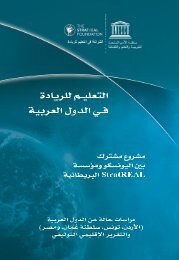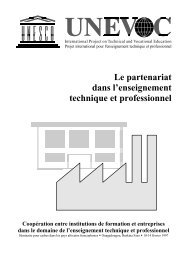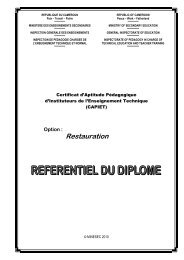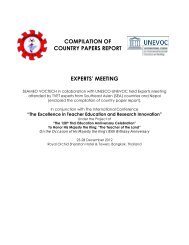Green TVET and Education for Sustainable ... - Unesco-Unevoc
Green TVET and Education for Sustainable ... - Unesco-Unevoc
Green TVET and Education for Sustainable ... - Unesco-Unevoc
Create successful ePaper yourself
Turn your PDF publications into a flip-book with our unique Google optimized e-Paper software.
INTRODUCTION<br />
Among the greatest challenges we face in the world<br />
today are those of delivering, growing or securing<br />
aordable natural resources including water <strong>for</strong> every<br />
citizen. Achieving sustainable development requires<br />
a global change of mindset <strong>and</strong> behaviors. Indeed,<br />
it has long been recognized that education is crucial<br />
<strong>for</strong> achieving sustainable development. e UN<br />
Conference on the Human Environment (‘Stockholm<br />
Conference’) in 1972 emphasized education as a way<br />
of addressing human-environment problems. Agenda<br />
21, the document adopted at the UN Conference<br />
on Environment <strong>and</strong> Development (UNCED, ‘Rio<br />
Summit’, Rio de Janeiro, 1992), likewise emphasized<br />
the need to promote education, public awareness <strong>and</strong><br />
training in order to assist bringing about sustainable<br />
development. In particular, Chapter 36 on promoting<br />
education, public awareness <strong>and</strong> training states that,<br />
“<strong>Education</strong> <strong>and</strong> Training are vital <strong>for</strong> promoting<br />
sustainable development <strong>and</strong> improving the<br />
capacity of the people to address environment <strong>and</strong><br />
development issues.”<br />
e Bonn Declaration (2004) in particular, gave<br />
special emphasis to the signicance of education <strong>for</strong><br />
the global development agenda <strong>and</strong> underlines the<br />
essential contribution of <strong>Education</strong> <strong>for</strong> <strong>Sustainable</strong><br />
Development (ESD) to shaping the purpose, content<br />
<strong>and</strong> quality of all educations including <strong>TVET</strong>.<br />
e Bonn Declaration on Learning <strong>for</strong> Work, Citizenship<br />
<strong>and</strong> Sustainability, argued that:<br />
. . . since education is considered the key to eective<br />
development strategies, technical <strong>and</strong> vocational<br />
education <strong>and</strong> training (<strong>TVET</strong>) must be the master key<br />
that can alleviate poverty, promote peace, conserve the<br />
environment, improve the quality of life <strong>for</strong> all <strong>and</strong> help<br />
achieve sustainable development.<br />
<strong>Education</strong> <strong>for</strong> <strong>Sustainable</strong> Development (ESD) can<br />
contribute substantially to address key sustainable<br />
development challenges. Indeed, without reorienting<br />
education, successfully confronting issues like water<br />
<strong>and</strong> climate change, among many others, will not be<br />
possible. In this light, it is becoming the central agenda<br />
in various major education <strong>and</strong> development <strong>for</strong>ums<br />
such as international conferences <strong>and</strong> negotiations<br />
including the G8, G20, Copenhagen Climate<br />
Change Conference (2009), EFA High-Level Group,<br />
UN Chief Executives Board <strong>and</strong> UNESCO World<br />
Conferences among many other ongoing events <strong>and</strong><br />
activities.<br />
e United Nations System sees an alternative future<br />
out of the crisis in terms of “<strong>Green</strong> Economy.” e<br />
Inter-agency statement of 25 June 2009 on <strong>Green</strong><br />
Economy:<br />
A trans<strong>for</strong>mation to address multiple cries clearly states,<br />
“e shi towards a green economy requires education<br />
<strong>for</strong> sustainable development”. Indeed, building green<br />
economies <strong>and</strong> sustainable societies requires more than<br />
clean technologies. Humankind will not solve the problems<br />
it faces today with the same values <strong>and</strong> approaches that<br />
created them.<br />
Hence, the international community needs to<br />
underst<strong>and</strong> green economies as sustainable societies,<br />
creating a balance between environmental, societal,<br />
cultural <strong>and</strong> economic considerations in the pursuit<br />
of enhanced quality of life. e educational process<br />
can facilitate an encouraging environment that in turn<br />
provide people with the chance to apply sustainable<br />
development principles <strong>and</strong> to beer underst<strong>and</strong><br />
the multiple potential impacts of their actions <strong>and</strong><br />
behaviors.<br />
Further, water is an essential <strong>and</strong> cross-cuing<br />
theme <strong>for</strong> ESD being a foundation of economy,<br />
society <strong>and</strong> the environment. It is thus reected as<br />
a priority by the UNESCO Member States among<br />
other emerging <strong>and</strong> recurrent issues. As concluded<br />
in the UN World Water Development Reports,<br />
the looming water crisis, more than a result of the<br />
availability of the resource, is a result of existing water<br />
governance approaches. <strong>Education</strong> at all levels <strong>and</strong> of<br />
all stakeholders has a decisive role to play in water<br />
governance <strong>and</strong> in integrated water management.<br />
<strong>Education</strong>al programmes requiring specic action<br />
needs to be developed in order to learn from each<br />
other’s experiences.<br />
It is increasingly acknowledged that sustainable<br />
solutions <strong>for</strong> water challenges strongly depend<br />
on the availability of adequately trained human<br />
resources, from high-level experts to communities<br />
<strong>and</strong> stakeholders. <strong>TVET</strong> needs to undertake action<br />
to create more exchange <strong>and</strong> knowledge plat<strong>for</strong>m <strong>for</strong><br />
International Experts Workshop on<br />
<strong>Green</strong> <strong>TVET</strong> <strong>and</strong> <strong>Education</strong> <strong>for</strong> <strong>Sustainable</strong> Development: Capacity Development Needs <strong>for</strong> Water <strong>Education</strong><br />
September 13-17, 2010 | Munich, Germany<br />
| 5



